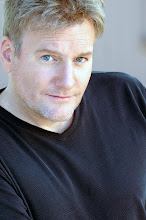
I first became familiar with Tim Russert via The Rush Limbaugh Show on talk radio. I had seen Russert on NBC-TV's "Meet The Press," but had never paid much attention to him, until I encountered his insight and perspective while being interviewed by Rush.
A few years later, I was impressed when he spoke to the American Federation Of Television And Radio Artists (A.F.T.R.A.), the union to which I belonged when I worked in broadcasting in Los Angeles.
I'll never forget his response, when asked if he had suggestions for up and coming journalists. "Learn spanish" he responded without hesitation. That was in the late 90's; now over a decade later, it's difficult to imagine that Russert's advice wasn't spot-on.
Most impressive to me is the outpouring of emotion that I've seen since the moment his death was announced Friday 06/13/08. CNN, Fox Newschannel, CNBC, CNN Headline News, and, of course, MSNBC, ALL interrupted their "regularly scheduled programming" to do 'wall-to-wall coverage" of Russert's news. And web portals as diverse as Huffington Post, Rush Limbaugh Dot Com, and The Drudge Report, all made the story "front and center."
Was that merely a matter of media industry professionals emoting, and using their platforms to publicy "go through the grieving process?"
Maybe, somewhat. And we might look back days from now, or months from now, and decide that the amount of coverage of Russert's death outpaced the audience demand for it.
Maybe, somewhat. And we might look back days from now, or months from now, and decide that the amount of coverage of Russert's death outpaced the audience demand for it.
But even if that is so, it says something about Russert. It says that this one man, Tim Russert, was such a big person and impacted his colleagues in such a profound and personal way, that they (his colleagues) are willing to sacrifice their better judgement on program content so as to convey an important story about a very important man.
As for me, I see parallel''s between Russert's life, and mine. He grew up lower middle class in New York state; I grew up a decade and a half behind him in a lower middleclass family in California. Tim's dad ("Big Russ") took him to see President John F. Kennedy when he came to their town for a visit. My dad took me to see President Gerald Ford when he visited our town. And Russert frequently expressed his amazement that a kid from his humble beginnings could grow up to do the things that he did. I am equally amazed at my station in life.
Newsweek's Howard Fineman put it all in perspective, when he spoke of Russert during MSNBC's coverage on Friday. "We've talked about Tim's love for journalism, and for politics" Fineman said. "Now let's talk about his love of his church. He loved his Catholic church. He loved the sense of order entailed in his church, he was a man of order....... Washington is full of many false gods, but Tim Russert had no time for false gods. He knew the one true God. He showed us that God..."
Thank You, God, for Tim Russert, and his example of a life lived large. Let us learn from him....




